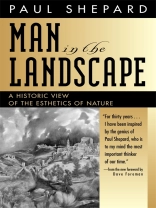A pioneering exploration of the roots of our attitudes toward nature, Paul Shepard’s most seminal work is as challenging and provocative today as when it first appeared in 1967. Man in the Landscape was among the first books of a new genre that has elucidated the ideas, beliefs, and images that lie behind our modern destruction and conservation of the natural world.
Departing from the traditional study of land use as a history of technology, this book explores the emergence of modern attitudes in literature, art, and architecture—their evolutionary past and their taproot in European and Mediterranean cultures. With humor and wit, Shepard considers the influence of Christianity on ideas of nature, the absence of an ethic of nature in modern philosophy, and the obsessive themes of dominance and control as elements of the modern mind. In his discussions of the exploration of the American West, the establishment of the first national parks, and the reactions of pioneers to their totally new habitat, he identifies the transport of traditional imagery into new places as a sort of cultural baggage.
About the author
PAUL SHEPARD (1925-1996) was Avery Professor of Natural Philosophy and Human Ecology at Pitzer College in Claremont, California. He is the author of twelve books, a number of which are available from the University of Georgia Press.










